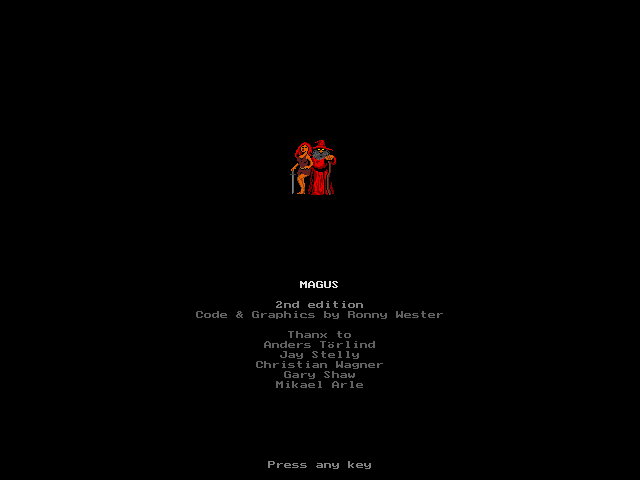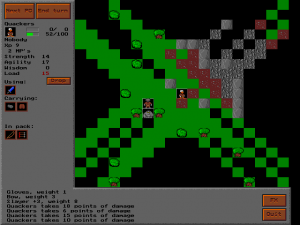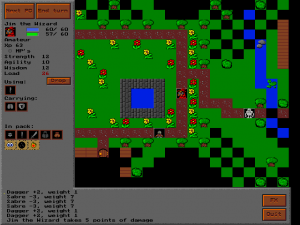Magus 
Somewhere in the world of Magus, the Dark One awaits you, cackling in their evil castle. If you don’t want to bother them though, that’s fine. The castle’s tough to find anyway.
Ronny Wester’s role-playing game Magus takes place in one big, open location. It has a single quest – to wander. There are no stories to follow, mythologies to uncover, or people to meet, just a big place. It’s a simple, lighthearted RPG, and it gives you room to enjoy how great wandering can be.
You begin in a small town up north, surrounded by a river. Magus lets you bring as many characters as you want for the journey. I stopped looking for a limit after creating a party with 50 people; the game runs super slowly, but it’s possible. You can decide to go it alone too. The game seems best suited for one to three characters.
You pick characters from a roster of stock fantasy archetypes, though it’s difficult to justify any class besides the Duck or the Duck Mage. (They probably come from the Swedish role-playing Drakar och Demoner, which features playable ducks.) Character classes start with different inventory items and suggested base stats – more agility for elves, magic points for wizards, and so on. But beyond the big differences, like using magic and the ducks walking on water, they all play similarly enough that you forget about their specializations.
In fact, Magus does everything it can to hide the statistical side of the RPG. After you select your characters’ stats at the beginning, you never deal with them again. There’s no currency either; you find everything lying on the ground. It’s not clear how much damage you do to enemies (you get a little “BiF” graphic for landing a hit or a “20k” if you hit hard), and that lack of transparency can be off-putting at first. The game conveys this information through suggestion and effects instead. I couldn’t tell for sure whether a flaming sword was better than the Dagger +2 my character already had equipped, but intuitively it felt more powerful.
Magus wants you to have an adventure, not think about specific stat management. That’s a liberating way to play a genre (computer RPGs) so often tied to numbers.
And so you walk around, and you find stuff. There could be a vault carved into the side of a mountain or a little town out in the woods. The game scatters monsters and items around the map randomly, so you never know whether an abandoned house will have a new spell scroll in it or if a skeleton will creep out of the shadows of the trees. (You can’t really talk to the enemies, but you can try to scare them by shouting “Booh!” It won’t work, and you’ll usually die.)
To the game’s detriment, moving around is a huge labor. You move each of your characters separately, then click a button to end your turn, then start over again. It controls like a battle in a turn-based strategy game but stretched across the entire game world. Even getting one character around the large map takes major effort, let alone 50 characters if you decided to do that for some reason.
The effort sends you places. With barely any story, Magus spins up personality in its world just by adding a creek or a fortress. You have no map, the graphics don’t have much detail, and you only see what’s in your character’s line of sight. Every patch of flowers or dirt path is a discovery.
Discovery in this game is worthwhile for its own sake. Sometimes you’ll come across a friendly creature that will thank you if you give them an item. The spells lying around the world have awesome, unexplained effects, like Hyperspace, which launches you to a random point on the map. There’s an island resting on a lake in the middle of nowhere, and it doesn’t matter if there’s actually anything on it because an island is such a cool thing to find.
You can journey in whatever direction with no pressure to defeat the Dark One, if you know to look for them at all. The game’s instructions say the main objective is “to have fun.” So it simplifies the rules, hides the lore and the numbers, and sends you on an adventure with your fifty friends… some of whom might be ducks.
Trivia!
An ambitious group of Magus fans uploaded every version of the game to GitHub along with its source code, a full map of the game (with some random objects and enemies already placed), and a detailed spreadsheet of stats for every item and enemy. These are terrific resources, though the map does spoil the experience a little.



